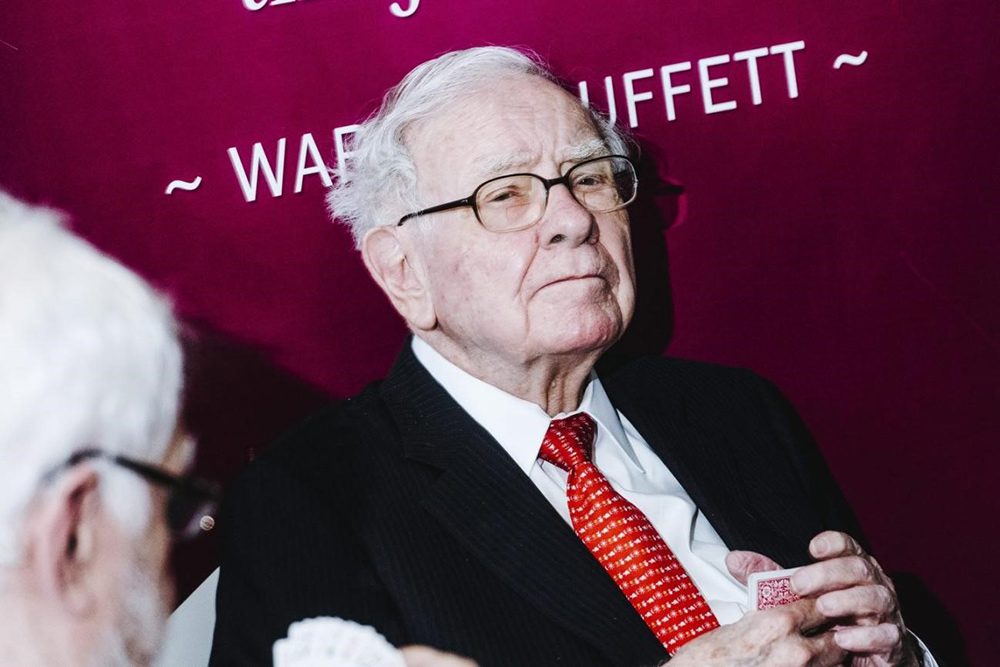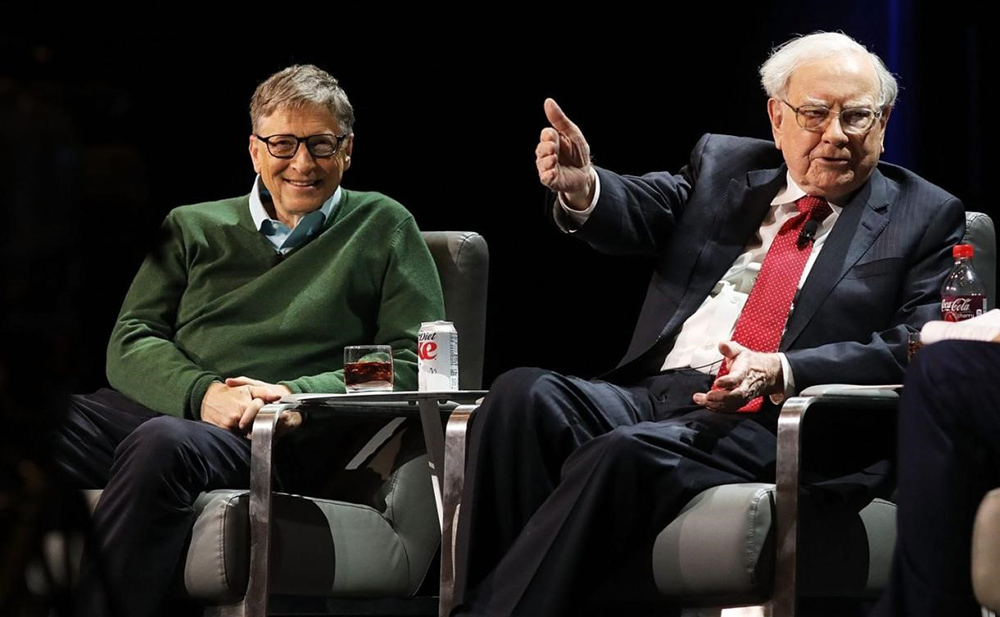
当全球最受尊敬的投资者之一沃伦·巴菲特发言的时候,所有人都应该用心倾听。作为规模庞大的财团伯克希尔-哈撒韦(Berkshire Hathaway)的首席执行官,92岁高龄的巴菲特现在很少有时间接受采访,因此他写给公司股东的公开信是华尔街的一件大事。
巴菲特以热衷于教导他人而闻名。他通常不仅会在公开信里讨论伯克希尔-哈撒韦的业绩,还会给年轻投资者提供建议,详细分析市场中的关键主题,有时候会批评首席执行官们的不当行为。今年的公开信也不例外,在这封11页长的公开信中,耄耋之年的巴菲特首先简单分析了人们对待储蓄和代际财富的态度发生的变化。
他在信里写道,以前的传统观念认为,储蓄是为了“维持退休后的生活水平”,去世后的遗产将留给家人朋友。但现在,巴菲特认为出现了一种新趋势,而且他认为伯克希尔-哈撒韦的投资者是这种趋势的先行者。简单来说,他对他和投资者们对慈善事业的支持感到自豪。
他写道:“我们的经历有所不同。我们认为,伯克希尔的每一位股东基本上是‘储蓄一时,储蓄一世’的类型。尽管这些人生活优渥,但他们最终会将大部分的资产捐献给慈善机构。”
巴菲特称,伯克希尔的目标是为这些“有奉献精神的储蓄者”创造更多的财富,而他们反过来会在去世后将大部分的财富捐献给慈善机构。他们并不像以前的投资者那样热衷于“打造帝国”,或者购买汽车和珠宝等华丽的“炫耀性资产”。相反,巴菲特认为他们的目标是积攒财富,享受优渥的生活。
有样学样?
伯克希尔-哈撒韦的投资者对代际财富和慈善的态度,似乎是在以巴菲特为榜样。2006年,巴菲特决定“逐步”捐出其持有的伯克希尔-哈撒韦的全部股票,放弃将资产留给子孙来打造商业帝国。这些股票在巴菲特的1,060亿美元净资产中占很大一部分。

2010年,巴菲特与微软(Microsoft)的联合创始人比尔·盖茨共同创立了“捐赠誓言”(Giving Pledge),承诺在有生之年或“去世后”捐出99%的财富。他的目标是号召其他亿万富翁作出类似的承诺,到目前为止,已经有120多位亿万富翁加入他的行列。
如今,巴菲特在伯克希尔的忠实追随者们似乎也在加入捐出个人财富的趋势,巴菲特对此非常高兴。“一个人如何处置金钱会暴露其本性。”他写道,“谁会不喜欢为我们这样的股东工作呢?”
但不只是伯克希尔的投资者正在改变“打造帝国”的心态。随着寿命延长和越来越多的人希望留下慈善遗产,将财富留给子孙后代的做法已经不再流行。
市场研究公司Cerulli Associates的数据显示,过去十年,婴儿潮一代留给X世代和千禧一代的财富约为84万亿美元。但其中约有12万亿美元已经被投入到慈善事业。Edelman Financial Engines的理财规划与市场营销负责人杰森·范德罗表示,美国只有37%的富人计划将财富留给家人。
他在2022年12月对美国消费者新闻与商业频道(CNBC)表示:“作为父母,我们总是很苦恼如何为子女提供支持。”他还指出,在婴儿潮一代,“这是我赚到的财富,你也应该努力”的心态越来越流行。这对他们的子女(以千禧一代为主)而言可能是一种无用的安慰,因为纽约联邦储备银行(New York Federal Reserve)最近发现,由于学生贷款增多,30岁左右的群体所背负的债务总计达到3.8万亿美元,创历史纪录。随着房价的历史性暴涨,千禧一代和Z世代与父母在同样的年龄拥有一套住房的可能性更低。
沃伦·巴菲特年度股东公开信的启示
巴菲特在最新股东公开信中除了赞扬伯克希尔-哈撒韦投资者节俭的生活态度和为慈善捐款的意愿以外,还包含一些与市场和经济有关的有趣消息。
尽管美国面临恶性通胀和加息,但巴菲特在信中依旧对经济表示乐观,他认为,尽管有对经济衰退的担忧,但看空美国经济从来不是好主意。
“我已经做了80年的投资,这超过美国建国时长的三分之一。尽管我们总是喜欢甚至热衷于自我批评和自我怀疑,但我从未见过长期做空美国是有意义的。”他写道。“而且我高度怀疑这封信的读者未来会有不同的经历。”
但巴菲特也向美国的公司高管提出了一条“重要警告”,他认为一些高管为了打动分析师伪造财务业绩,这可能给投资者带来严重问题。
他写道:“这种行为令人厌恶。伪造财务业绩不需要天赋:只需要有强烈的欺骗他人的欲望。一位首席执行官曾经向我描述他的诡计是‘大胆而富有想象力的会计行为’,这已经成为资本主义的耻辱之一。”
巴菲特还稍微进行了回顾分析,称自己只是“马马虎虎的”管理者,他坦言,自己之所以从1965年以来能够取得“令人满意的业绩”,主要是得益于对可口可乐(Coca-Cola)和美国运通(American Express)等公司的十多笔重要投资。
他表示:“在管理伯克希尔的58年里,我的大多数资本配置决策只不过是马马虎虎而已。此外,在某些情况下,我的糟糕决策也是靠着极大的运气才得以挽救。”
巴菲特说道,他的错误给投资者带来的启示很简单:只要几笔成功的投资就可以“创造奇迹”。
“在鲜花盛开的时候,野草枯萎同样重要。”他说。“当然尽早行动和活到90岁,同样有助于创造奇迹。”(财富中文网)
译者:刘进龙
审校:汪皓
沃伦·巴菲特在每年一度的致伯克希尔-哈撒韦公司股东的公开信中称赞了投资者对慈善事业的支持。
当全球最受尊敬的投资者之一沃伦·巴菲特发言的时候,所有人都应该用心倾听。作为规模庞大的财团伯克希尔-哈撒韦(Berkshire Hathaway)的首席执行官,92岁高龄的巴菲特现在很少有时间接受采访,因此他写给公司股东的公开信是华尔街的一件大事。
巴菲特以热衷于教导他人而闻名。他通常不仅会在公开信里讨论伯克希尔-哈撒韦的业绩,还会给年轻投资者提供建议,详细分析市场中的关键主题,有时候会批评首席执行官们的不当行为。今年的公开信也不例外,在这封11页长的公开信中,耄耋之年的巴菲特首先简单分析了人们对待储蓄和代际财富的态度发生的变化。
他在信里写道,以前的传统观念认为,储蓄是为了“维持退休后的生活水平”,去世后的遗产将留给家人朋友。但现在,巴菲特认为出现了一种新趋势,而且他认为伯克希尔-哈撒韦的投资者是这种趋势的先行者。简单来说,他对他和投资者们对慈善事业的支持感到自豪。
他写道:“我们的经历有所不同。我们认为,伯克希尔的每一位股东基本上是‘储蓄一时,储蓄一世’的类型。尽管这些人生活优渥,但他们最终会将大部分的资产捐献给慈善机构。”
巴菲特称,伯克希尔的目标是为这些“有奉献精神的储蓄者”创造更多的财富,而他们反过来会在去世后将大部分的财富捐献给慈善机构。他们并不像以前的投资者那样热衷于“打造帝国”,或者购买汽车和珠宝等华丽的“炫耀性资产”。相反,巴菲特认为他们的目标是积攒财富,享受优渥的生活。
有样学样?
伯克希尔-哈撒韦的投资者对代际财富和慈善的态度,似乎是在以巴菲特为榜样。2006年,巴菲特决定“逐步”捐出其持有的伯克希尔-哈撒韦的全部股票,放弃将资产留给子孙来打造商业帝国。这些股票在巴菲特的1,060亿美元净资产中占很大一部分。
沃伦·巴菲特与比尔·盖茨。
2010年,巴菲特与微软(Microsoft)的联合创始人比尔·盖茨共同创立了“捐赠誓言”(Giving Pledge),承诺在有生之年或“去世后”捐出99%的财富。他的目标是号召其他亿万富翁作出类似的承诺,到目前为止,已经有120多位亿万富翁加入他的行列。
如今,巴菲特在伯克希尔的忠实追随者们似乎也在加入捐出个人财富的趋势,巴菲特对此非常高兴。“一个人如何处置金钱会暴露其本性。”他写道,“谁会不喜欢为我们这样的股东工作呢?”
但不只是伯克希尔的投资者正在改变“打造帝国”的心态。随着寿命延长和越来越多的人希望留下慈善遗产,将财富留给子孙后代的做法已经不再流行。
市场研究公司Cerulli Associates的数据显示,过去十年,婴儿潮一代留给X世代和千禧一代的财富约为84万亿美元。但其中约有12万亿美元已经被投入到慈善事业。Edelman Financial Engines的理财规划与市场营销负责人杰森·范德罗表示,美国只有37%的富人计划将财富留给家人。
他在2022年12月对美国消费者新闻与商业频道(CNBC)表示:“作为父母,我们总是很苦恼如何为子女提供支持。”他还指出,在婴儿潮一代,“这是我赚到的财富,你也应该努力”的心态越来越流行。这对他们的子女(以千禧一代为主)而言可能是一种无用的安慰,因为纽约联邦储备银行(New York Federal Reserve)最近发现,由于学生贷款增多,30岁左右的群体所背负的债务总计达到3.8万亿美元,创历史纪录。随着房价的历史性暴涨,千禧一代和Z世代与父母在同样的年龄拥有一套住房的可能性更低。
沃伦·巴菲特年度股东公开信的启示
巴菲特在最新股东公开信中除了赞扬伯克希尔-哈撒韦投资者节俭的生活态度和为慈善捐款的意愿以外,还包含一些与市场和经济有关的有趣消息。
尽管美国面临恶性通胀和加息,但巴菲特在信中依旧对经济表示乐观,他认为,尽管有对经济衰退的担忧,但看空美国经济从来不是好主意。
“我已经做了80年的投资,这超过美国建国时长的三分之一。尽管我们总是喜欢甚至热衷于自我批评和自我怀疑,但我从未见过长期做空美国是有意义的。”他写道。“而且我高度怀疑这封信的读者未来会有不同的经历。”
但巴菲特也向美国的公司高管提出了一条“重要警告”,他认为一些高管为了打动分析师伪造财务业绩,这可能给投资者带来严重问题。
他写道:“这种行为令人厌恶。伪造财务业绩不需要天赋:只需要有强烈的欺骗他人的欲望。一位首席执行官曾经向我描述他的诡计是‘大胆而富有想象力的会计行为’,这已经成为资本主义的耻辱之一。”
巴菲特还稍微进行了回顾分析,称自己只是“马马虎虎的”管理者,他坦言,自己之所以从1965年以来能够取得“令人满意的业绩”,主要是得益于对可口可乐(Coca-Cola)和美国运通(American Express)等公司的十多笔重要投资。
他表示:“在管理伯克希尔的58年里,我的大多数资本配置决策只不过是马马虎虎而已。此外,在某些情况下,我的糟糕决策也是靠着极大的运气才得以挽救。”
巴菲特说道,他的错误给投资者带来的启示很简单:只要几笔成功的投资就可以“创造奇迹”。
“在鲜花盛开的时候,野草枯萎同样重要。”他说。“当然尽早行动和活到90岁,同样有助于创造奇迹。”(财富中文网)
译者:刘进龙
审校:汪皓
When Warren Buffett, one of the most well-respected investors on the planet, speaks (or writes), people pay attention. And since the 92-year-old CEO of Berkshire Hathaway rarely has time for interviews these days, his annual letter to the shareholders of his mega conglomerate is a big event on Wall Street.
Known for his love of teaching, Buffett typically uses his letter not only to discuss Berkshire’s performance, but also to advise younger investors, break down key themes in markets, and sometimes criticize the misbehavior of CEOs. This year’s letter was no different, as the nonagenarian began the 11-page brief with a brief monologue on changing attitudes about saving and generational wealth.
In the past, he wrote, the conventional wisdom was that people saved money in order to “maintain their living standards after retirement,” and any extra money was then left to family and friends. But these days, Buffett claimed a new trend has emerged, and he put Berkshire Hathaway investors at the forefront of it. In short, he’s proud of how philanthropic he and his investors have become.
“Our experience has differed. We believe Berkshire’s individual holders largely to be of the once-a-saver, always-a-saver variety. Though these people live well, they eventually dispense most of their funds to philanthropic organizations,” he wrote.
Buffett said that his goal at Berkshire is to enrich these “dedicated savers,” who, in turn, will give the majority of their wealth to charity upon their death. These investors aren’t interested in “dynasty building” like many of their predecessors, or fancy “look-at-me assets” like cars and jewelry. Instead, their goal is to build wealth and live well, according to Buffett.
Monkey see, monkey do?
Berkshire Hathaway investors seem to be following in Buffett’s footsteps when it comes to their views on generational wealth and philanthropy. In 2006, Buffett decided that he would “gradually” give away all of his Berkshire Hathaway stock—which makes up the bulk of his $106 billion net worth—forgoing building a dynasty by giving the funds to his children.
Then, in 2010, Buffett started the Giving Pledge with Microsoft cofounder Bill Gates, promising to donate 99% of his wealth sometime during his life of “at death.” His goal was to persuade his fellow billionaires to follow suit, and so far, more than 120 have agreed to the cause.
Now Buffett’s loyal following at Berkshire appear to be joining the giving trend—and the billionaire is pleased with the results. “The disposition of money unmasks humans,” he wrote. “Who wouldn’t enjoy working for shareholders like ours?”
But it’s not just Berkshire investors who are changing their minds on “dynasty building.” As life expectancy and the desire to leave a charitable legacy increases, passing wealth onto the next generation is going out of style.
Some $84 trillion could pass from baby boomers to Generation X and millennials over the next decade, according to data from the market research firm Cerulli Associates. But of that, some $12 trillion is already headed to philanthropy. And just 37% of wealthy U.S. adults have a plan in place to transfer their wealth to their families, according to Jason Van de Loo, head of wealth planning and marketing at Edelman Financial Engines.
“As parents, we are struggling with how to support our kids,” he told CNBC in December, adding that there is a growing “I earned this and so should you” mindset among baby boomers. This may be cold comfort to their children, who largely comprise the millennial generation, given that the New York Federal Reserve just found a historic $3.8 trillion in debt has been accumulated by thirtysomething members of that generation as student loans pile up. And with the historic surge in home prices, both millennials and Gen Z are far less likely to own a home than their parents were at the same age.
Notes from Warren Buffett’s annual letter
Beyond lauding Berkshire Hathaway investors’ frugal attitudes and willingness to give to charity, Buffett’s latest shareholder letter contained some fascinating tidbits about markets and the economy.
Despite stubborn inflation and rising interest rates, the billionaire struck an optimistic tone in the letter, contending that even amid recession fears, betting against the American economy is never a good idea.
“I have been investing for 80 years—more than one-third of our country’s lifetime. Despite our citizens’ penchant—almost enthusiasm—for self-criticism and self-doubt, I have yet to see a time when it made sense to make a long-term bet against America,” he wrote. “And I doubt very much that any reader of this letter will have a different experience in the future.”
But the Berkshire CEO also offered “an important warning” to American executives, arguing that some are manipulating financial results to impress analysts, which could lead to serious problems for investors.
“That activity is disgusting. It requires no talent to manipulate numbers: Only a deep desire to deceive is required. ‘Bold imaginative accounting,’ as a CEO once described his deception to me, has become one of the shames of capitalism,” he wrote.
In a bit of retrospective analysis, Buffett then called himself a “so-so” manager, contending that his “satisfactory results” since 1965 have largely been the result of a dozen or so great investments in companies like Coca-Cola and American Express.
“In 58 years of Berkshire management, most of my capital-allocation decisions have been no better than so-so,” he said. “In some cases, also, bad moves by me have been rescued by very large doses of luck.”
Buffett said the lesson for investors within his mistakes is simple: It only takes a few winning investments to “work wonders.”
“The weeds wither away in significance as the flowers bloom,” he said. “And, yes, it helps to start early and live into your 90s as well.”






